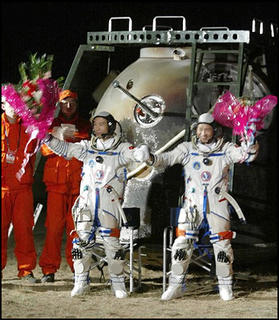
Here's another update on the Kettle and the chinese guys with 'the right stuff'. We salute you!
This photo released by China's Xinhua News Agency shows Chinese astronauts Fei Junlong, left, and Nie Haisheng hold flowers in front of the re-entry capsule of China's second manned spacecraft, Shenzhou 6, after landing in Siziwang Banner County, north China's Inner Mongolia Autonomous Region Monday, Oct. 17, 2005. The space capsule carrying two Chinese astronauts landed by parachute in the country's northern grasslands before dawn Monday following a five-day mission meant to affirm China's status as an emerging space power. Astronauts Fei and Nie were "in good health" and "feeling good" after their Shenzhou 6 capsule touched down at 4:32 a.m. (2032 GMT) in the Inner Mongolia region, the official Xinhua News Agency said. (AP Photo/Xinhua, Zhao Jianwei)
So, the second manned Chinese space mission returned safely to Earth.
Here's a section from the AP Report.
BEIJING Oct 17, 2005 — An elated public celebrated the successful landing Monday of China's second manned space flight, a feat that a senior Chinese leader declared a victory for the Communist Party and a boost to the country's status as a space power.
The pre-dawn landing of the Shenzhou 6 capsule on the country's northern grasslands was shown live on television as part of a propaganda effort meant to rouse support for the ruling party.
Scenes of astronauts Fei Junlong and Nie Haisheng emerging smiling and waving were shown throughout the day on television, sparking an outpouring of patriotic excitement about China's growing technological might.
"It's really incredible and we're all filled with pride," said Li Guoqiang, a Shanghai electrician. "It's about developing and expressing our national strength."
Fei and Nie were flown to Beijing, where they received a hero's welcome, riding in an open car in a parade past thousands of cheering soldiers at a military base.
State television showed residents of Fei's hometown of Kunshan, west of Shanghai, setting off firecrackers and weeping with joy.
"This will further improve the country's international status and national strength, and will help to mobilize its people to rally around the Communist Party and work harder for the future of the country," said Wu Bangguo, the party's No. 2 leader, who watched the landing at a Beijing control center.
Far out. It's already China. How much more international status and national strength does this nation need? :)
"Today, every son of the Yellow Emperor feels very proud," said Shanghai furniture salesman Zhang Jinhua, 34, referring to the legendary founder of the Chinese nation.
Communist leaders hope that such sentiment will shore up their standing at a time of public frustration with corruption, wrenching economic change and a growing gap between rich and poor.
Shenzhou 6 flew 2 million miles in 115 hours, 32 minutes in space, Xinhua said. The mission was far longer and more complex than the 2003 flight, when astronaut Yang Liwei orbited for 21 1/2 hours.
The flight cost some $110 million, Tang said.
The government says the manned space program has cost a total of $2.3 billion _ a fraction of the budget of its American counterpart.
The government says it wants to land an unmanned probe on the moon by 2010 and send up an orbiting laboratory.
China has had a rocketry program since the 1950s and launched its first satellite in 1970. The manned space program began in 1992.
The Shenzhou 6 is a modified version of Russia's Soyuz capsule. China also bought Russian technology for spacesuits, life-support systems and other equipment. But space officials say all the items launched into orbit were Chinese-made.
And so it goes.

No comments:
Post a Comment